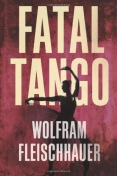BKMT READING GUIDES
Fatal Tango
by Wolfram Fleischhauer
Paperback : 416 pages
1 club reading this now
0 members have read this book
Introduction
Giulietta Battin has devoted herself to ballet, earning a coveted spot as a dancer with the Staatsoper Berlin. But when she decides to explore a new style of music?the tango?life as she knows it changes forever. Soon after beginning her musical adventure, she meets Argentinean tango dancer Damián Alsina. They begin a torrid affair?which quickly turns into a nightmare. Damián suddenly sabotages his own performance with a bizarre, improvised choreography. His passionate creativity excites Giulietta, until Damián's strange behavior culminates in a shocking act: he kidnaps and tortures her jealous father. Horrified, she demands answers, but Damián has fled to Buenos Aires and her father, his victim, is being suspiciously unforthcoming. So Giulietta follows her lover to South America, where her journey into the world of tango confronts her with the unspeakable horrors of the country's brutal past. But denial will never silence art, and as Giulietta learns to decipher the true significance of Damián's dance style, she finds the key to the mystery of her lover´s past and the terrifying truth that connects it with her own.
Amazon Exclusive: A Q&A with Wolfram Fleischhauer
Question: What inspired you to write this story?

Wolfram Fleischhauer: The first time I spent an evening in a Milonga (a tango club) I knew I would one day write a novel set in the tango universe. What immediately fascinated me were the codes. I was completely taken in not only by the sophistication of the music and the dance, but also by all the rituals that go along with it: the unspoken rules, the glances, the body language. I love codes. I think art is a way of expressing the unspeakable. So from the very beginning I had the idea of a tango dancer whose dance contains a secret.
Q: How did you become interested in tango and how did you decide to use it as the backdrop for this story?
WF: I discovered tango for two reasons: Astor Piazzolla and Feminism. Piazzolla's album Tango Zero Hour just blew my mind. I must have listened to this record a thousand times. This was in the late 1980's. I was living in Berlin, I had almost completed my MA in German and American Literature. I wanted to write novels but had no clear idea how and about what, and I was single again after a painful breakup. At that point in time, feminism had reached its peak, especially in Berlin. So when I visited some tango bars, I was very surprised to see that the place was teeming with women who I knew to be very outspoken about male chauvinism. The same women who considered it a provocation if you held the door for them were dancing tango in sleazy tango joints-- dressed to kill and expecting to be "led!" The Tango Renaissance in the 1980's was the first sign of a strange cultural reversal and as such it was an ideal starting point for the kind of novel I write: the cultural suspense novel.
Q: History is also an important part of this book. What research did you do in the process of writing this story?
WF: The first time I went to Buenos Aires I went mainly for the tango. I had no clear idea about my novel yet and I didn?t know all that much about the recent history of Argentina. What I saw, heard and read was so shocking, so abominable, that I actually cut my visit short by a week because I could not stand being there anymore. A year later I went back. This time, I was much better prepared. I had read a lot and I confronted the issues head-on. I interviewed many people, survivors, victims, parents and children of disappeared persons, scientists who work on mass graves, and so forth. It was a heartbreaking experience, and after some of these meetings I just went back to my hotel and cried. But now I had a means of coping with all this: my novel. I now knew what Damián had gone through and what he and Giulietta were up against. They had gotten under my skin and I was now determined to write that story. Of course, after this second visit, the plot changed significantly. I wrote a completely new draft and suddenly there was a power and urgency in the narrative that had not been there before. The novel had sprung to life.
Q: Have you always wanted to be an author? What other careers have you pursued?
WF: I always felt that I am a storyteller. But I don?t see myself as a writer or author. My ideal has always been the Renaissance man who participated in life on as many levels as possible: physical, emotional, intellectual, and artistic. Storytelling and writing the kind of books I write give me the possibility to live many lives, at least occasionally. I play the guitar pretty well and used to write folk songs and lyrical ballads. If ever I run out of material for novels, I will go back to singing my stories.
Discussion Questions
No discussion questions at this time.Book Club Recommendations
Recommended to book clubs by 0 of 0 members.
Book Club HQ to over 90,000+ book clubs and ready to welcome yours.
Get free weekly updates on top club picks, book giveaways, author events and more








